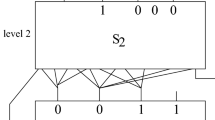Abstract
Trakhtenbrot calls a setA autoreducible ifA is Turing-reducible toA via an oracle Turing machine that never queries the oracle about the input string. Yao considers sets that are autoreducible via probabilistic, polynomial-time oracle Turing machines, and he calls such setscoherent. We continue the study of autoreducible sets, including those that are autoreducible via a family of polynomial-sized circuits, which we callweakly coherent. Sets that are not weakly coherent are calledstrongly incoherent. We show
-
Ifs is superpolynomial and space-constructible, then there is a strongly incoherent set in DSPACE (s(n)).
-
If NEEEXP\( \nsubseteq \) BPEEEXP, then there is a set in NP that is incoherent.
-
IfA is complete for any of the classes ∑ p i , ∏ p i , or Δ p i ,i≥0, thenA is coherent. In particular, all NP-complete sets are coherent.
As corollaries, we obtain new lower bounds onprogram checkability andrandom-self-reducibility. These results answer open questions posed by Yao and by Blum and Kannan.
Similar content being viewed by others
References
M. Abadi, J. Feigenbaum, andJ. Kilian, On Hiding Information from an Oracle,J. Comput. System Sci. 39 (1989), 21–50.
L. Adleman, Two Theorems on Random Polynomial Time, inProc. of the 19th Symposium on Foundations of Computer Science (1978), IEEE, 75–83.
D. Angluin and D. Lichtenstein,Provable Security of Cryptosystems: A Survey, YALEU/DCS/TR-288, 1983.
L. Babai, L. Fortnow, andC. Lund, Nondeterministic Exponential Time has Two-Prover Interactive Protocols,Computational Complexity 1 (1991), 3–40.
R. Beigel, M. Bellare, J. Feigenbaum, and S. Goldwasser, Languages that are Easier than their Proofs, inProc. of the 32nd Symposium on Foundations of Computer Science (1991), IEEE, 19–28.
R. Beigel and J. Feigenbaum,On the Complexity of Coherent Sets, AT&T Bell Laboratories Technical Memorandum, February, 1990.
R. Beigel and J. Feigenbaum,Improved Bounds on Coherence and Checkability, Yale University Technical Report, YALEU/DCS/TR-819, September, 1990.
M. Bellare and S. Goldwasser,The Complexity of Decision versus Search, MIT-LCS Technical Memorandum, TM-444, April, 1991.
M. Blum,Designing Programs to Check Their Work, Intl. Comput. Sci. Inst. Technical Report, 88–009, 1988.
M. Blum and S. Kannan, Designing Programs that Check Their Work, inProc. of the 21st Symposium on Theory of Computing (1989), ACM, 86–97.
M. Blum, M. Luby, and R. Rubinfeld, Self-Testing/Correcting with Applications to Numerical Problems, inProc. of the 22nd Symposium on Theory of Computing (1990), ACM, 73–83.
M. Blum, M. Luby, and R. Rubinfeld, Program Result Checking against Adaptive Programs and in Cryptographic Settings, inDistributed Computing and Cryptography, DIMACS Series in Discrete Mathematics and Theoretical Computer Science2 (1991), AMS, 107–118.
R. Book, Tally Languages and Complexity Classes,Inf. and Control 26 (1974), 186–193.
J. Feigenbaum and L. Fortnow, On the Random-Self-Reducibility of Complete Sets, inProc. of the 6th Structure in Complexity Theory Conference (1991), IEEE, 124–132.
J. Feigenbaum, S. Kannan, and N. Nisan, Lower Bounds on Random-Self-Reducibility, inProc. of the 5th Structure in Complexity Theory Conference (1990), IEEE, 100–109.
L. Fortnow, J. Rompel, and M. Sipser, On the Power of Multiprover Interactive Protocols, inProc. of the 3rd Structure in Complexity Theory Conference (1988), IEEE, 156–161.
S. Goldwasser, S. Micali, andC. Rackoff, The Knowledge Complexity of Interactive Proof Systems,SIAM J. Comput. 18 (1989), 186–208.
J. Hartmanis, V. Sewelson, and N. Immerman, Sparse Sets in NP-P: EXPTIME versus NEXPTIME, inProc. of the 15th Symposium on Theory of Computing (1983), ACM, 382–391.
R. Impagliazzo and M. Sudan, Private communication, March, 1991.
K. Ko, On Helping by Robust Oracle Machines,Theor. Comput. Sci. 52 (1987), 15–36.
R. Lipton, New Directions in Testing, inDistributed Computing and Cryptography, DIMACS Series on Discrete Mathematics and Theoretical Computer Science2 (1991), American Mathematical Society, 191–202.
C. Lund, L. Fortnow, H. Karloff, and N. Nisan, Algebraic Methods for Interactive Proof Systems, inProc. of the 31st Symposium on Foundations of Computer Science (1990), IEEE, 2–10.
N. A. Lynch, A. R. Meyer, M. J. Fischer, Relativization of the Theory of Computational Complexity,Trans. Amer. Math. Soc. 220 (1976), 243–287.
U. Schöning, Robust Algorithms: A Different Approach to Oracles,Theor. Comput. Sci. 40 (1985), 57–66.
A. Shamir, IP=PSPACE, inProc. of the 31st Symposium on Foundations of Computer Science (1990), IEEE, 11–15.
M. Tompa and H. Woll, Random Self-Reducibility and Zero-Knowledge Interactive Proofs of Possession of Information, inProc. of the 28th Symposium on Foundations of Computer Science (1987), IEEE, 472–482.
B. Trakhtenbrot, On Autoreducibility,Doklady Akad. Nauk. SSSR 192 (1970), 1224–1227— in Russian. Translation inSoviet Math. Dokl. 11 (1970), 814–817.
B. Trakhtenbrot, Autoreducible and not autoreducible predicates and sets, inStudies in Theory of Algorithms and Mathematical Logic, Academy of Sciences of the USSR — Computing Center, A. Markov and N. Petri (eds.), 1973, 211–234 — in Russian.
A. C. Yao, Coherent Functions and Program Checkers, inProc. of the 22nd Symposium on Theory of Computing (1990), ACM, 84–94.
Author information
Authors and Affiliations
Rights and permissions
About this article
Cite this article
Beigel, R., Feigenbaum, J. On being incoherent without being very hard. Comput Complexity 2, 1–17 (1992). https://doi.org/10.1007/BF01276436
Received:
Issue Date:
DOI: https://doi.org/10.1007/BF01276436



